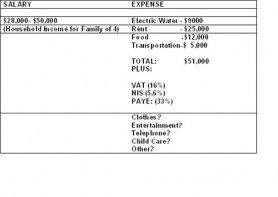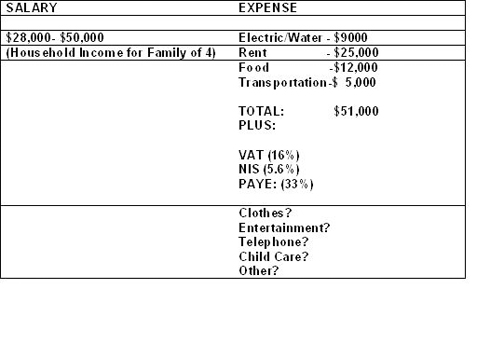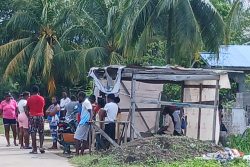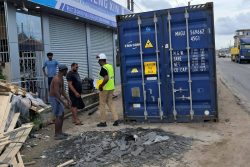By Peter R. Ramsaroop, MBA
Introduction
Economic growth requires a partnership between the public and private sectors. It necessitates cooperation and a collaborative group effort. Although many have been outspoken on this subject for quite some time now, including myself, there has yet to be any noteworthy progress in Guyana toward such noble goals. One spin doctor last week blasted my column on Lethem and Guyana opportunities with Brazil. He tried to make the case that his PPP government was ahead of the curve on the Brazilian connection plan. I wonder if he knows they are about ten years behind. In the late 90s when the Guyana 21 plan which included the connection with Brazil came out and was marketed to the PPP, they rejected it. They are over ten years behind and now proud that a delegation from Brazil just visited. Why were they sleeping this entire time, spin doctor?
 Rightfully so, the PPP anxiety level increases daily and there is an extreme urgency to frantically appease the forlorn citizens who are coming to terms with the fact that they have just wasted five more years of the nation’s history on yet another sub par government. However, there is only so much money the PPP can dispense and when the well runs dry, only its incompetence will remain.
Rightfully so, the PPP anxiety level increases daily and there is an extreme urgency to frantically appease the forlorn citizens who are coming to terms with the fact that they have just wasted five more years of the nation’s history on yet another sub par government. However, there is only so much money the PPP can dispense and when the well runs dry, only its incompetence will remain.
The brain drain continues to steal our human resources away to foreign shores because the local economy is so unfortunate. Meanwhile, our borders remain indifferent to the trickle of foreign investors who may have an interest in our country, thereby rejecting the very ones who could help infuse life into our economy; retain our human capital and encourage the return of our Guyanese migrants with a more enabling business environment and high quality jobs.
Refreshing our memory
President Jagdeo during the high profile 50th anniversary of Banks DIH told Guyanese that the private sector must rise to the challenge of being the driver of enhanced competitiveness and greater economic growth. President Jagdeo then pledged that any government he leads would not allow the country “to return to the days where the government tried to be all things to all people, and in so doing sapped the spirit of entrepreneurship throughout the country.” President Jagdeo since that time has been out of the country more than in, and must not have realized that his government has monopolized must of the major industries and have failed badly at it, especially sugar.
A comprehensive view
Over the years, Dr Clive Thomas has stated many fundamental facts about Guyana’s economic performance and global competitiveness. One such statement was that, “In a stable political environment, with minimal crime, a strong macro-economic policy and a ‘pro-business’ approach to economic management, it is expected that firms will generally do better than in an economy where any or all of these conditions are lacking. Having to pay for private security, because security is weak, adds to a firm’s costs and reduces its competitiveness. Where judicial processes are weak and public administration is arbitrary and whimsical, firms will seek to leave or minimise their investments in that country. In a worst case scenario of endemic violence, business becomes all but impossible.”
In Guyana, we have poor or non-existent electricity supply and when it is available, it is extremely expensive. An antiquated telecommunications regulatory framework, high energy costs, a colonial era transportation network and an under-educated population because of a poor school system and massive out-migration add to the poor competitiveness of Guyanese companies. Sugar is a good example. We are producing sugar at far above global prices. These challenges do not lead to the climate of competitiveness promised by the President.
Government officials and ghost writers are coming out of the woodwork to defend the government policies on taxes and their other “achievements”. What those officials and ghost writers should be addressing is: Why are everyday people finding it so difficult to feed their families and pay their light bills?
The reality of public servants, retail workers, and thousands of others, you fill in the numbers.
 I stopped listing the line items on the expense side because it is impossible for families to live a basic life on that income. Yet the government continues to feel pleased that they have accomplished so much. So much of what? Imagine your $1 from 1992 buys 16 cents today. You are not really better off than you were in 1992 when it comes to how much the money you have in hand can buy. When the PPP tells you that the minimum wage went from $3,000 in 1992 to $28,000 today, in reality today’s money buys less than it did in 1992.
I stopped listing the line items on the expense side because it is impossible for families to live a basic life on that income. Yet the government continues to feel pleased that they have accomplished so much. So much of what? Imagine your $1 from 1992 buys 16 cents today. You are not really better off than you were in 1992 when it comes to how much the money you have in hand can buy. When the PPP tells you that the minimum wage went from $3,000 in 1992 to $28,000 today, in reality today’s money buys less than it did in 1992.
The continued state of poverty and the repercussions of this condition, such as crime and migration, are constant reminders of how the current administration is simply biding time until the next elections in 2011, with the hope of hoodwinking the people into once again believing that they will improve the lives of Guyanese. Based on their performance over the past 18 years, it is hard to believe that they even really understand the issues relevant to Guyana’s sustainable development.
Conclusion
When as a country we each start taking the initiative to move beyond apathy to doing something to lead to social progress in Guyana and break the cycle of poverty, then we will see a true “development agenda” being implemented that will actually lead to an improvement in the quality of life for all the Guyanese people. In my next few columns I will expand on such an agenda. In the meantime, are you willing to volunteer as a tutor for a child, or to babysit a young mother’s child while she attends school or help build a home for your poor neighbour? Can you spare just a few hours a week for the future of your country? Do you know how vital your participation and sacrifice is to the future of your country? A bright and positive future for depends on our reply!
Until next time “Roop”
peter.ramsaroop@gmail.com








